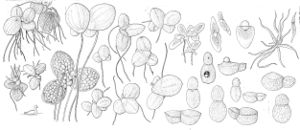Difference between revisions of "Lemna trisulca"
Sp. Pl. 2: 970. 1753.
FNA>Volume Importer |
FNA>Volume Importer |
||
| Line 33: | Line 33: | ||
-->{{#Taxon: | -->{{#Taxon: | ||
name=Lemna trisulca | name=Lemna trisulca | ||
| − | |||
|authority=Linnaeus | |authority=Linnaeus | ||
|rank=species | |rank=species | ||
| Line 48: | Line 47: | ||
|publication year=1753 | |publication year=1753 | ||
|special status= | |special status= | ||
| − | |source xml=https://jpend@bitbucket.org/aafc-mbb/fna-data-curation.git/src/ | + | |source xml=https://jpend@bitbucket.org/aafc-mbb/fna-data-curation.git/src/f50eec43f223ca0e34566be0b046453a0960e173/coarse_grained_fna_xml/V22/V22_187.xml |
|genus=Lemna | |genus=Lemna | ||
|species=Lemna trisulca | |species=Lemna trisulca | ||
Revision as of 19:56, 16 December 2019
Roots to 2.5 cm (sometimes not developed), tip pointed; sheath not winged. Green stalks 2–20 mm. Fronds submersed (except when flowering or fruiting), 3–50, coherent and very often forming branched chains, narrowly ovate, flat, thin, 3–15 mm (excluding stalk), 2–3.5 times as long as wide, base suddenly narrowed into green stalk, margins denticulate distally; veins (1 or) 3, lateral veins only in proximal part of frond; papillae absent; anthocyanin often present; air spaces shorter than 0.3 mm; turions absent. Flowers: ovaries 1-ovulate, utricular scale with narrow opening at apex. Fruits 0.6–0.9 mm, laterally winged toward apex. Seeds with 12–18 distinct ribs, staying within fruit wall after ripening. 2n = 40, 42, 44, 60, 63, 80.
Phenology: Flowering (rare) late spring–summer.
Habitat: Mesotrophic, quiet waters rich in calcium, in cool-temperate regions
Elevation: 0–3000 m
Distribution

Alta., B.C., Man., N.B., N.W.T., N.S., Nunavut, Ont., P.E.I., Que., Sask., Yukon, Alaska, Ariz., Ark., Calif., Colo., Conn., Idaho, Ill., Ind., Iowa, Kans., Maine, Md., Mass., Mich., Minn., Mo., Mont., Nebr., Nev., N.H., N.J., N.Mex., N.Y., N.Dak., Ohio, Oreg., Pa., R.I., S.Dak., Tenn., Utah, Vt., Va., Wash., W.Va., Wis., Wyo., nearly worldwide, except arctic and antarctic regions and South America, in warm regions only in mountains.
Discussion
The report of Lemna trisulca in Florida is dubious because the climate is too warm. The species may be temporarily introduced there by birds.
Selected References
None.
